Key Takeaways
- Hiring a great PHP developer takes more than checking for Laravel experience or years in the industry. You need someone who can write scalable code, solve real-world problems, and collaborate well with your team—especially if they’re inheriting legacy systems.
- The PHP talent pool is shrinking, which makes it harder (and slower) to find the right fit. A clear hiring process and smart sourcing strategy can help you move faster and avoid costly missteps.
- In the US, PHP developer salaries typically range from $58,000 to $139,700, depending on experience, but hiring in other regions can offer significant savings. For example, in Latin America, typical salaries range from $36,000 to $84,000.
PHP isn’t dead. It just powers over 75% of the web quietly while newer languages take the spotlight. From WordPress and Shopify to Laravel-based apps, PHP still handles a lot of heavy backend work.
But because the PHP talent pool is shrinking, finding someone who can write clean, scalable, and secure code with it is increasingly difficult.
Hiring a great PHP developer means more than checking boxes for frameworks or years of experience. You need someone who can solve real business problems, communicate clearly, and integrate quickly with your team. That’s true whether they work in your office, remotely in the US, or from another country.
If you’re trying to figure out how to hire a dedicated PHP developer, this guide breaks it down.
You’ll learn what PHP developers actually do, how much they cost, which skills to look for, where to find great candidates, how to evaluate them, and which mistakes to avoid.
What Do PHP Developers Do?
PHP developers build and maintain server-side logic that powers dynamic websites, applications, and APIs.
They write backend code, connect it with front-end components, manage databases, and focus on performance, security, and scalability. Whether it’s a custom CMS or a Laravel-based web app, they’re essential for bringing dynamic functionality to life.
It’s important to note that PHP developers aren’t typically responsible for UI design or DevOps tasks. Instead, they collaborate with front-end and infrastructure teams.
Stack Overflow surveys show that PHP is used by about 10% of all developers globally, and a whopping 43% indicate they want to continue using it. PHP plays a major role in platforms like WordPress, Symfony, and countless internal business tools.
How Much Does It Cost to Hire a Dedicated PHP Developer?
Salaries for PHP developers can vary significantly depending on region, experience level, and hiring model (full-time vs. contract).
In the US, ongoing demand for backend engineers has kept salaries high across most industries. Even junior PHP developers can command sizable compensation packages.
Here’s a general look at what PHP developers earn in the US:
- Junior PHP developers typically earn $58,000 to $115,500 per year.
- Mid-level developers fall in the range of $115,500 to $122,100.
- Senior developers can command between $122,100 and $139,700.
But if you’re open to hiring outside the US, salary expectations drop considerably—without any drop in quality if you hire right.
For example, in Latin America (where we’ve sourced hundreds of developers), companies often see savings of 30–60% compared to US salaries.
This isn’t about underpaying talent. It’s about hiring fairly within a different economic environment where your budget stretches further.
According to our 2025 salary benchmarks, here’s how average salary ranges compare between US and Latin America:

That’s a cost savings of up to 53% by hiring in LatAm.
That significant cost difference allows many teams to hire senior-level developers on a junior-level budget. It also makes it possible to build out entire engineering squads for what one US hire might cost.
Because developer rates offshore are typically lower than in the US due to regional cost-of-living differences, international hiring can stretch your budget without sacrificing quality.
Hiring offshore isn’t about underpaying talent.
It’s about hiring fairly within a different market, where your budget goes further. These global differences reflect economic conditions, not a gap in skill or professionalism. This is exactly what makes hiring an offshore PHP developer so effective and beneficial when done right.

What Skills Should You Look for When Hiring a Dedicated PHP Developer?
Great PHP developers don’t just write backend code. They make architecture decisions, provide scalability, keep security top of mind, and communicate clearly with teammates across the stack. Working solo or inside a cross-functional team, you need someone who brings both technical expertise and a strong sense of accountability.
According to our recruiters who specialize in this role, hiring the right developer means knowing what to prioritize and not just checking boxes on a resume.
Below, we’re looking at how these must-have skills break down.
Hard skills (the must-haves)
The best PHP developers have:
- Modern PHP proficiency: They should be confident working with object-oriented PHP, using tools like Composer for dependency management, and following best practices around namespaces and autoloading. These fundamentals impact scalability and code maintainability.
- Framework experience: Look for familiarity with Laravel or Symfony. Laravel is especially common in modern builds due to its developer-friendly syntax and ecosystem. CodeIgniter is also still used in some legacy environments.
- Database management: Experience with both SQL and NoSQL databases is valuable. Look for experience with MySQL, PostgreSQL, and MongoDB at a minimum. Ask about past projects that required data modeling or optimization for large-scale applications.
- API development and integration: Most PHP developers should know how to build and consume RESTful APIs. Bonus points if they’ve worked with GraphQL in more modern stacks.
- CI/CD, Docker, and microservices: If your team uses containers or microservice architecture, developers should have experience setting up pipelines or working in environments that use Docker and Kubernetes. It shows they can deploy and maintain modern infrastructure.
- Security best practices: Expect a solid understanding of common PHP vulnerabilities, like SQL injection, CSRF, or XSS, and how to prevent them using input validation, output escaping, and encryption.
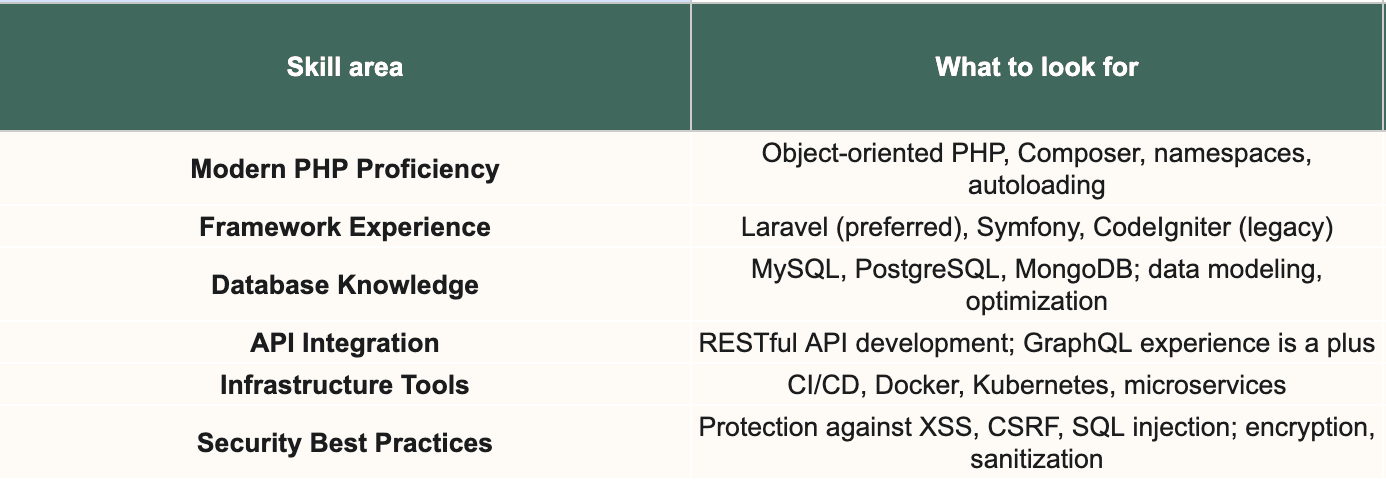
Soft skills (equally important)
According to our recruiters, the most successful candidates typically combine strong technical skills with even stronger soft skills.
PHP projects often involve legacy systems, business logic, and stakeholder input. This means collaboration and adaptability are essential.
- Clear communication: They should be able to explain what they’re doing to both technical and non-technical teammates. This becomes especially important when discussing architectural trade-offs or debugging complex issues.
- Problem-solving mindset: Look for candidates who can describe challenges they’ve worked through, not just finished tasks. Yes, great developers write code, but they also fix problems that matter to the business.
- Accountability and ownership: Ask about projects where they led initiatives or took responsibility for fixing issues. Ownership is especially important when teams are distributed.
- Openness to feedback: A top tip from our recruiter is to ask how candidates respond to constructive criticism. If they’ve never received feedback or can’t give examples, that might be a red flag.
- Cross-functional collaboration: Many PHP roles require working with designers, product managers, or QA teams. Strong candidates are comfortable gathering requirements, giving input, and adapting to evolving priorities.
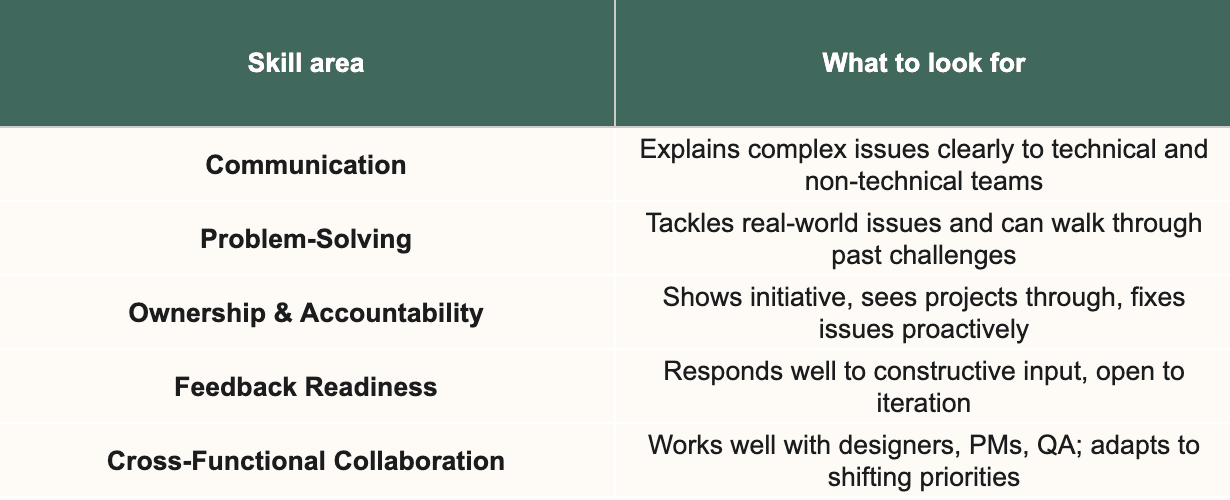
Nice-to-have skills (the differentiators)
These extras can set great candidates apart, especially on complex teams or fast-moving products.
- DevOps familiarity: Basic experience with deployment tools, monitoring, or logging systems (like Jenkins or Prometheus) helps developers support the full lifecycle of their code.
- Front-end exposure: Some PHP developers, especially those working in Laravel, also know their way around Vue or React. This makes them more effective collaborators on full-stack teams.
- Testing mindset: While not every company practices TDD, candidates should know PHPUnit and have experience writing and maintaining tests. Interestingly, the 2024 JetBrains State of PHP survey found that 28% use tools like PHP CS Fixer or PHPStan, but 49% don’t use any QA tools at all. That’s a missed opportunity. You should look for candidates who take testing seriously.
- Performance and caching: Speed matters. Developers who understand performance profiling or caching tools like Redis or Varnish can help your apps run faster and more reliably.
- Fluency in English: If you’re hiring internationally, fluency in English makes a real difference in communication. This is especially true if you’re conducting code reviews, standups, or require written documentation.
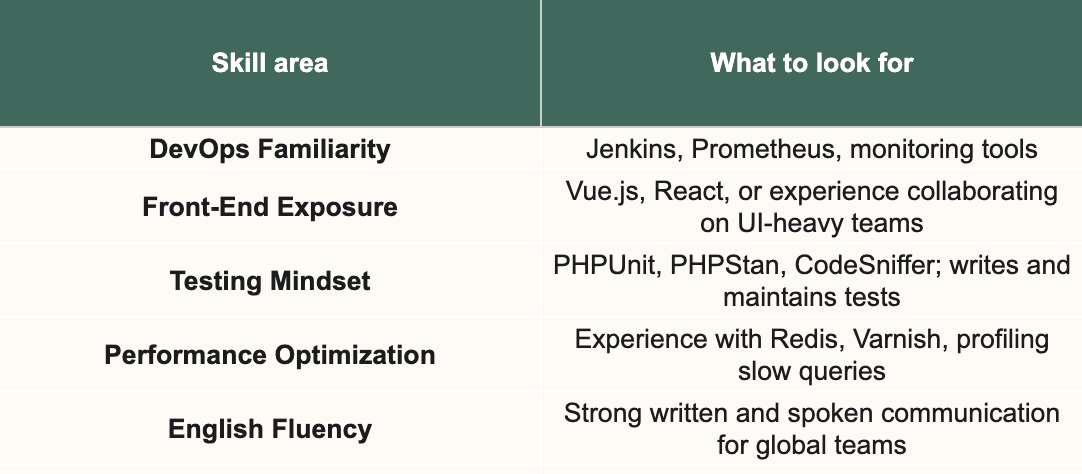
If you’re still defining what you need from this role, our guide on writing a software developer job description can help clarify your priorities before you start the hiring process.
Where Can You Find and Hire Great Dedicated PHP Developers?
Finding the right PHP developer starts with two key decisions:
- Where you want to hire from (local, US-remote, or international)
- Which channels you will use to source candidates
Let’s look at both options in more detail.
Choosing where to hire from
PHP development is well-suited for remote work, especially when the right communication and collaboration processes are in place.
So, rather than asking if the role can be done remotely, the more useful question is what matters most to your team: Real-time collaboration, budget flexibility, or in-person integration?
Each option has trade-offs:
In-office or local developers:
- More control over daily collaboration
- Easier onboarding and in-person integration
- Often significantly higher costs
- Smaller talent pool, especially outside major tech hubs
Remote US-based developers:
- Access to a wider range of candidates
- Familiarity with US business practices and cultural norms
- No need to manage international compliance
- Salary expectations close to in-office ranges
International/offshore developers:
- Access to highly skilled professionals in broader talent pools
- Significant savings, often 30–60% less than US equivalents
- Adds diverse perspectives and flexible resourcing
- May require more intentional communication strategies
Latin America often strikes the best balance for US-based teams. Developers in the region offer strong English skills, excellent technical backgrounds, and a time zone alignment with the US that supports real-time collaboration.
The market has matured significantly in recent years, and we’ve seen an increase in senior-level PHP talent across countries like Mexico, Colombia, and Argentina.
While cost is a big factor in choosing Latin America for offshoring, the wide talent pool and skills available there are just a few of the reasons why many US businesses are looking to LatAm talent.
That said, strong talent also exists in Eastern Europe and Southeast Asian countries like the Philippines, especially for companies comfortable with asynchronous workflows or building around different time zones.
Choosing the right sourcing channel
Once you’ve settled on your hiring geography, it’s time to decide how you’ll find candidates. Each method has its pros and cons.
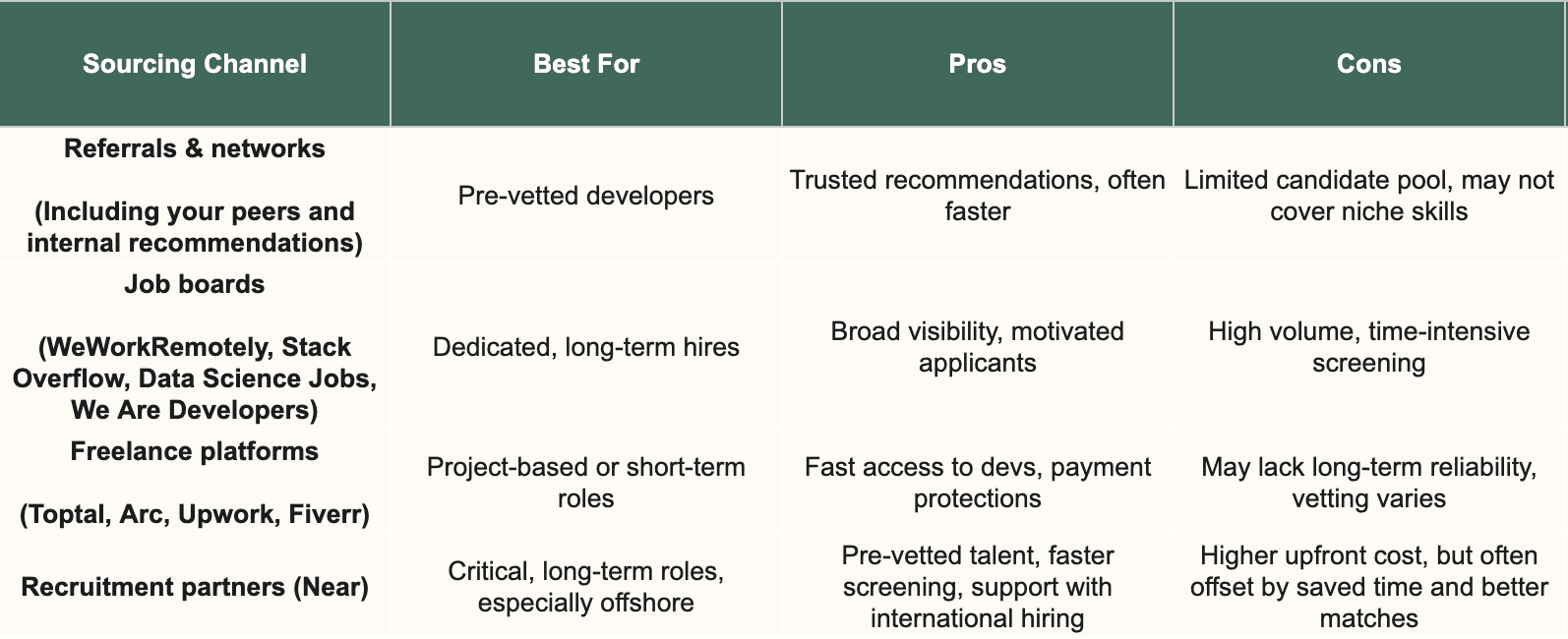
PHP developers are available across all these channels, but results vary depending on the seniority level you’re looking for and your internal capacity for screening.
For example, freelance platforms might work well for testing developers before bringing them on full-time, while top recruitment firms are often best for building reliable, long-term backend teams—especially when hiring abroad.
Each channel has a place in your strategy. You might start with referrals, post to job boards, and then turn to a recruitment partner if those options don’t bring in the right candidates.
This layered approach can help you find a PHP developer more efficiently and with less guesswork.
How to Hire the Best Dedicated Developers: Best Practices
Hiring PHP developers is hard. Hiring someone who can write clean code, handle legacy systems, contribute to scalable architecture, and collaborate across teams is even harder.
The good news is that breaking the process into clear stages helps you avoid false starts and wasted time.
Here’s how we guide our clients through it.
Stage 1: Define the role before you start
Don’t chase the PHP “jack of all trades.” Get clear about what you actually need
Companies often go looking for a PHP developer who can manage legacy migrations, write perfect Laravel code, and double as a DevOps engineer. That kind of “do it all” candidate is rare, expensive, and usually not what you really need.
Instead, define what success looks like in the first six months. Do you need help maintaining older PHP code, building APIs, or scaling a Laravel app? Be honest about your priorities.
According to our recruiters who specialize in backend roles, one of the most common hiring mistakes is failing to clarify whether PHP is part of your long-term roadmap or just maintaining legacy infrastructure.
If you’re still running version 5.6 or earlier, keep in mind that the State of Laravel survey found very few developers have recent experience with PHP version 5.x and below. Be clear about that in the job description, or you’ll lose qualified candidates fast.
Your job description should filter, not just attract
Great PHP developers want clarity.
Be specific about your framework (Laravel, Symfony, CodeIgniter), database (MySQL, PostgreSQL, MongoDB), and workflow expectations.
The Zend 2025 PHP developer survey also indicated that the majority of PHP devs are deploying on-premises. So, you’ll need to call out if you’re using Azure or Google Cloud applications to avoid mismatches.
Also note: not all PHP developers work with CMSs. JetBrains found that only 5% are actively using Drupal, and even fewer are touching Joomla.
If those platforms are critical to your tech stack, say so upfront. Otherwise, don’t assume every PHP developer can jump into CMS-heavy work without context.
If you’re still shaping a remote PHP role, we recommend reviewing best practices for writing remote worker job descriptions that actually attract serious candidates.
Stage 2: Screen and evaluate with more than just a resume
Go beyond the portfolio and test real-world skills
Anyone can list Laravel or REST APIs on a resume. The best way to evaluate skill is to give candidates a task: debug a snippet, refactor a chunk of code, or build a basic API with test coverage. Keep it small and focused. Then review the solution together to see how they think through trade-offs.
A top tip from our recruiter is to assess how well candidates understand clean code principles like SOLID. If they can’t explain why their code is structured the way it is, they may not be as senior as they seem. The same applies if they can’t explain how they could make it more maintainable.
Look for communication and ownership
The best PHP developers don’t just write code. They ask smart questions, identify edge cases, and speak clearly about technical decisions with stakeholders.
One of our recruiters recommends asking candidates to explain a past bug or system failure they fixed. You’ll learn a lot about their mindset, not just their technical skill.
Also watch for red flags like vague project histories or dodging questions about feedback. Developers who can’t talk through their past roles or challenges typically lack experience or accountability.
Stage 3: Make a compelling offer quickly
Move fast and make it count
Strong PHP developers don’t stay available for long. Once you’ve identified the right person, move quickly. Set clear expectations for timelines, and don’t let your offer process drag.
In our experience matching hundreds of candidates, companies that delay often lose out to more decisive competitors.
A good offer doesn’t just include a fair salary. It includes role clarity, flexible hours, growth opportunities, and the autonomy to do great work.
If you’re hiring internationally, make sure your offer aligns with local expectations. This includes things like paid time off, payment terms, and the option to take off local holidays often matter as much as the base salary.
Need more help getting that part right? Our guide to making good job offers and retaining talent explains how to secure and keep top hires.
Top Interview Questions for Finding the Right PHP Developer
Interviewing PHP developers is about more than checking if they know what ‘foreach’ does. You want to understand how they solve problems, work with others, and approach real business needs. A great resume might show their experience. These questions show you how they actually think.
Below are five questions to help you uncover the right fit.
“Tell me about a time you inherited messy PHP code. How did you handle it?”
Reveals: Ownership, refactoring skill, and mindset
Look for: Candidates who walk you through how they diagnosed the problem, cleaned up the code, added tests, and documented changes. A strong answer includes specific steps and clear reasoning.
Red flag: If they blame the previous developer or skip over documentation and testing, they may lack accountability.
“Can you walk me through a recent Laravel project you worked on?”
Reveals: Real-world framework experience
Look for: Clear explanation of their role, how they structured routes, used services or controllers, and how they approached common tasks like authentication or validation.
Red flag: Vague or overly theoretical responses often mean limited hands-on experience.
“How do you test your code, and what tools do you use?”
Reveals: QA habits and attention to quality
Look for: Use of tools like PHPUnit, coverage reports, and test automation workflows (like GitHub Actions or CircleCI). They should also be able to explain why testing matters in their process.
Red flag: Developers who say they “just test manually” or don’t see the need for automated tests often create long-term tech debt.
“How do you approach security risks in your PHP code?”
Reveals: Security awareness and practical prevention skills
Look for: Familiarity with input sanitization, output escaping, database query safety (prepared statements), and using HTTPS or encryption when appropriate.
Red flag: Candidates who speak in general terms without specific strategies may not know how to implement secure code in practice.
“How do you typically respond to feedback from teammates or managers?”
Reveals: Emotional intelligence and growth mindset
This question comes straight from one of our recruiters. It helps you understand how a candidate handles critique. This is something that’s especially important in collaborative engineering environments.
Look for: A specific story where feedback led to better outcomes. A great answer includes what they learned and how they applied it.
Red flag: Defensiveness or answers like “I don’t really get much feedback” can indicate poor communication or a lack of self-awareness.

Common Mistakes to Avoid When Hiring a Dedicated PHP Developer
Even with a solid hiring plan, it’s easy to make avoidable missteps when hiring PHP developers.
Here are five mistakes that often lead to poor hires, wasted time, or lost candidates, and what to do instead.
1. Prioritizing cost over quality
It’s understandable to want to stay within budget.
But treating PHP development like a commodity service rarely leads to good outcomes. Cheap rates can come with poor documentation, unstable code, or inconsistent delivery.
Hiring internationally does lower costs, but success depends on choosing candidates for their long-term value, not just their rate.
If you’re looking beyond the US, make sure you know the ins and outs of how to hire the best developer before making an offshore hire.
2. Taking too long to hire
Top PHP developers often have multiple offers. If your hiring process drags across several weeks or includes unnecessary assessments, candidates will lose interest or accept other roles.
Keep the process tight. One screening call, a single test assignment, and a follow-up discussion are usually enough to evaluate fit. If you delay, you may miss out on the person you actually wanted.
3. Filtering too hard on degrees
Some of the best developers in Latin America don’t have traditional computer science degrees. In many cases, they’ve been working on real projects long before finishing school and may even choose not to attend university at all.
According to our recruiters, rigid degree requirements often eliminate excellent candidates who have already proven their skills in the real world. Focus on what they’ve built, how they solve problems, and how well they communicate instead.
4. Assuming all PHP experience is interchangeable
Not all PHP developers work on the same types of systems. One candidate might have deep experience in Laravel-based apps, while another has spent years developing in WordPress. Their skills may overlap, but they aren’t drop-in replacements for each other.
Be clear about your environment and toolset, and don’t assume a great Laravel developer is also fluent in CMS architecture or legacy codebases. Matching past experience with your current stack increases the chances of a fast, confident start.
5. Skipping structured onboarding
Even the most experienced developer needs time to understand your systems, workflows, and expectations. Hiring someone and expecting them to deliver production-ready code in the first few days is unrealistic.
Plan a structured onboarding process that includes access to documentation, clear goals for the first few weeks, and time to get up to speed. This sets up your new hire and the rest of your team for long-term success.
Why Working with a Recruiting Partner Makes a Difference
Hiring a PHP developer on your own is absolutely possible.
Many teams find success using internal recruiters, job boards, and referrals, especially when they have the time and in-house support to manage sourcing and screening.
But if you’re hiring on a tight deadline, need to fill a highly specialized role, or plan to hire outside the US, it may be worth bringing in expert help.
International hiring often includes additional challenges like vetting across time zones, managing contracts, or navigating local compliance and compensation norms.
A recruitment partner can help define the role more clearly, identify strong candidates faster, and reduce the risk of mismatched expectations.
They also filter out unqualified applicants and provide context on regional salary norms, so your offer hits the mark the first time. In our experience, recruiting support becomes especially valuable when hiring in new markets.
There is a cost to using a partner, but many clients find that the time saved, the quality of candidates, and the reduced risk of a bad hire more than make up for it.
If you’re looking to hire a single developer or even build out an entire team, bringing in expert support can help you hire with confidence and avoid costly delays.
What About Outsourcing PHP Development?
If you’re researching how to hire a PHP developer, there’s a good chance you’ve also considered outsourcing. It can seem faster, simpler, and less risky than building an in-house or remote team—especially when you just need to get something built.
MVP, need short-term help on a defined project, or lack internal technical leadership, working with an agency or offshore team might help you get across the finish line.
But there are real trade-offs to consider.
When you outsource PHP development, you’re often trading direct control for speed. You may not know exactly who is writing your code, whether they’ll still be on your project in three months, or how scalable the solution will be long-term.
And while costs may look lower upfront—especially if you are offshoring your PHP development—projects that lack clarity, continuity, or quality assurance can quickly go over budget.
That’s why many companies eventually transition away from outsourced development in favor of hiring dedicated developers.
If your PHP application is central to your business—whether it’s powering e-commerce, managing user data, or supporting your internal operations—you’re likely better off investing in someone who’s fully integrated into your team.
When you hire directly, you gain visibility, long-term stability, and the ability to build institutional knowledge over time. You’re not just buying code—you’re building capability.
Final Thoughts
If you’re here, it’s probably because you need to hire a PHP developer—and fast. Maybe your team is drowning in legacy code, or simply can’t afford another false start, and you know you can’t afford to get this wrong.
There’s strong PHP talent out there. But the pool is smaller than it used to be, and the best candidates get snapped up quickly.
That’s why clarity, speed, and a structured process make all the difference. Define exactly what you need, evaluate candidates on how they think—not just what’s on paper—and move decisively when you find the right fit.
If working with a recruitment partner seems like the right approach for your needs, consider a firm that understands how to reduce hiring risk without cutting corners.
At Near, we can connect you with pre-vetted PHP developers across Latin America who offer strong communication skills, time zone compatibility, and reliable experience at fair, regionally aligned rates.
Ready to find the right PHP developer without wasting time or budget?
Book a free consultation with Near today.
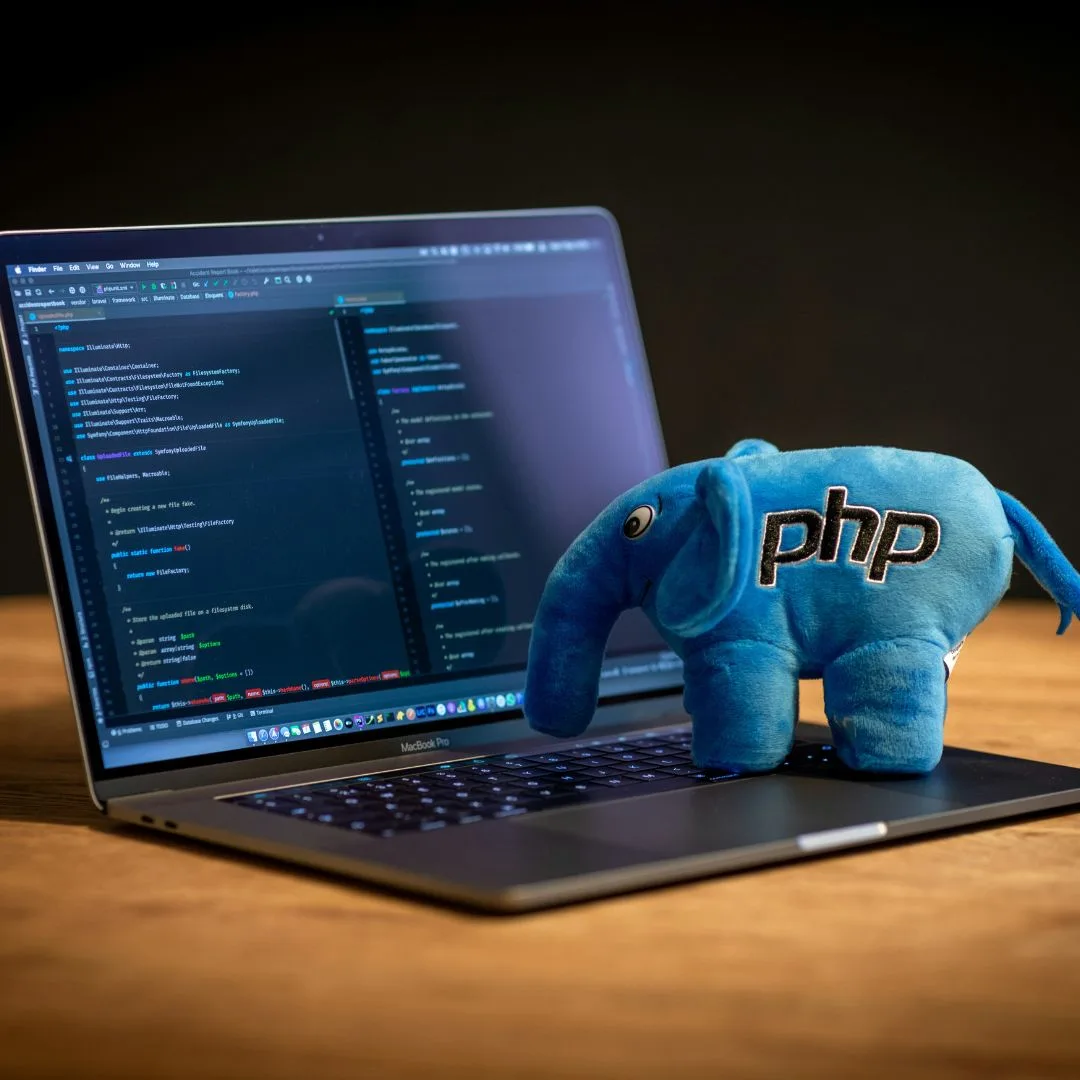











.webp)


.png)






%20(1).png)
%20(1).png)
